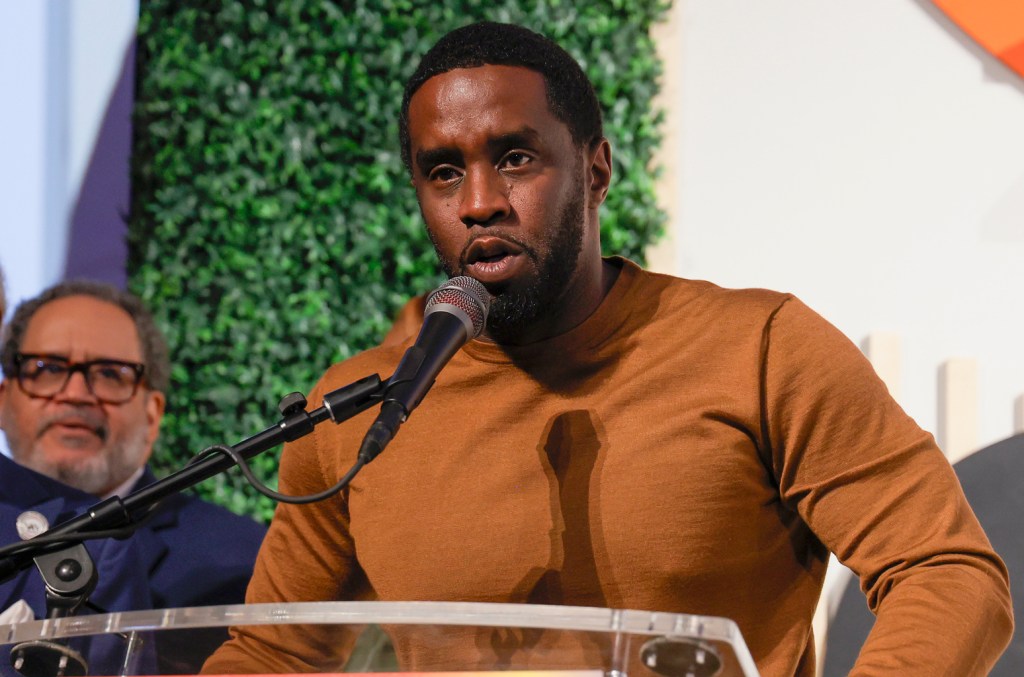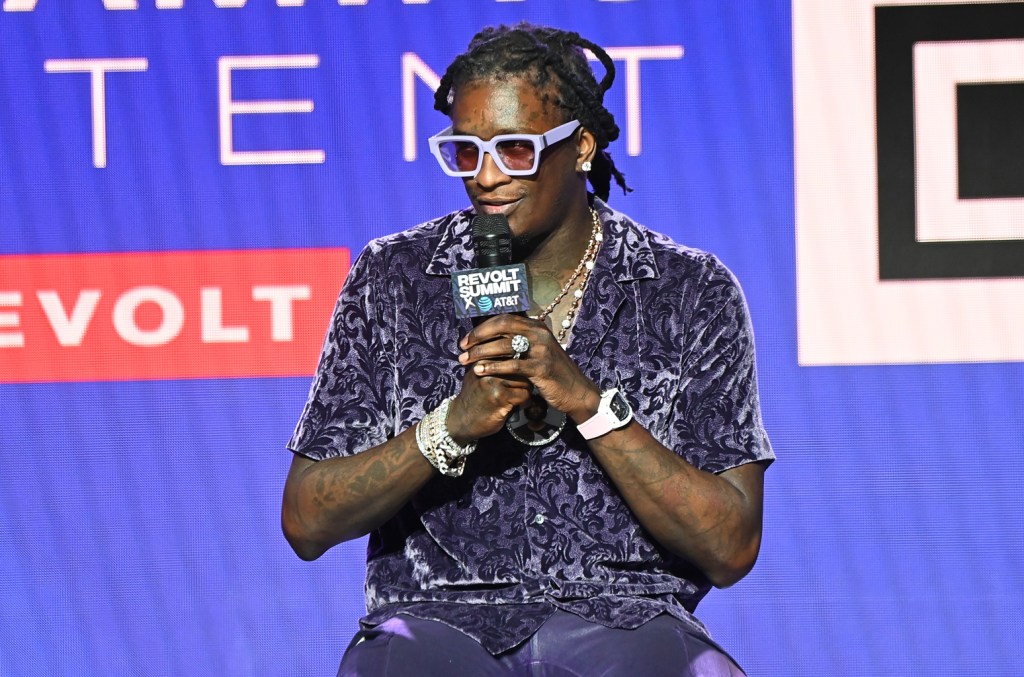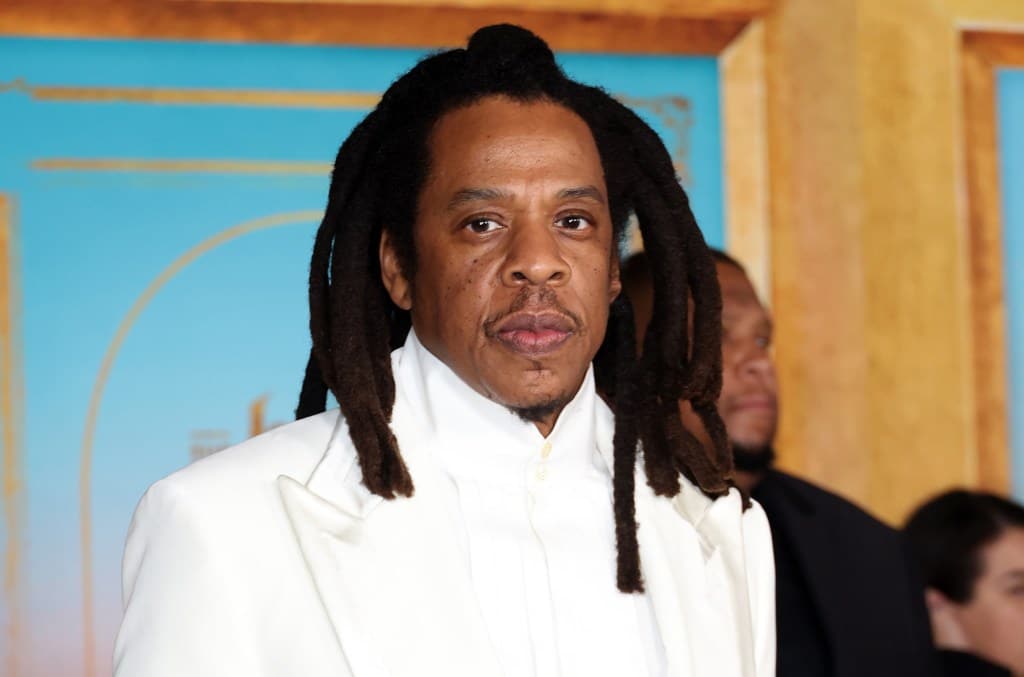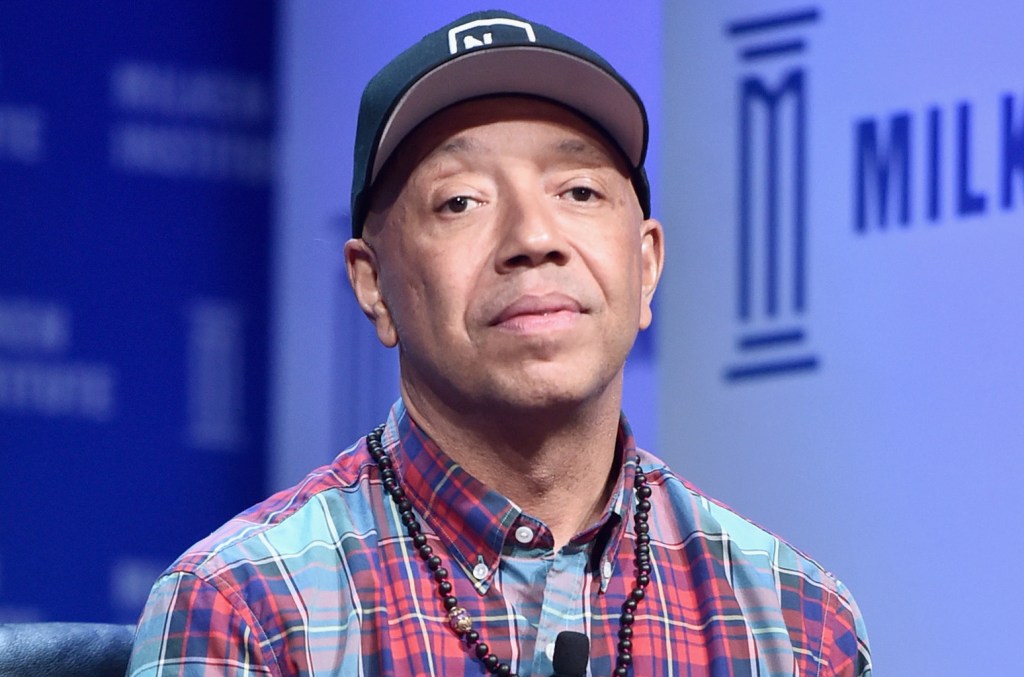Legal
Page: 13
More than three years after Young Thug, Gunna and dozens of others were indicted in Atlanta on gang charges, Thug’s last co-defendant has pleaded guilty.
A trial had been set to start Monday (June 9) in Fulton County court for Christian Eppinger, who stood accused of attempted murder for allegedly shooting an Atlanta police officer in 2022. But he instead entered a so-called Alford plea, allowing him to technically plead guilty while maintaining that he is innocent; he was later sentenced to 40 years in prison.
Eppinger was the last remaining defendant of 28 men indicted in May 2022 by Fulton County prosecutors, who claimed that Thug’s “YSL” — nominally a record label — was also a violent gang called “Young Slime Life” that had wrought “havoc” on Atlanta for years. Thug was released from jail in October after a judge sentenced him to just probation, a stunning defeat for District Attorney Fani Willis after her office had labeled him a dangerous gang boss.
Asked Friday (June 6) if the massive prosecution had been a “waste of taxpayer money,” Willis vehemently defended the case and stressed that it had resulted in 19 convictions: “What my constituents say, who just voted me by 68 percent, is she’s doing an amazing job,” Willis told Atlanta’s NBC affiliate. “We are making sure that this community is safe.”
A representative for the DA’s office did not immediately return a request for comment on Monday.
Pitting prosecutors in America’s rap capital against a chart-topping rapper who helped shape the sound of hip-hop in the 2010s, the YSL case captivated the music business for years. Most notably, it relied heavily on song lyrics as evidence, a controversial practice that has drawn backlash from the music industry and efforts by lawmakers to stop it.
The case also saw Thug sit in jail for years while the messy proceedings — the longest in state history — played out in court, turning his charges into a cause célèbre and raising big questions about procedural fairness. Gunna, a frequent collaborator and protégé of Thug, was also initially charged, though he quickly pleaded out.
The charges against Thug and the other YSL members were built on Georgia’s Racketeer Influenced and Corrupt Organizations, a state-level version of the federal RICO law used against the Mafia, drug cartels and other large criminal enterprises. Prosecutors alleged that members of the YSL enterprise had committed murders, carjackings, drug dealing and many other crimes — and that Thug was the “King Slime” crime boss running the operation from the top.
But when the trial kicked off in January 2023, that sweeping narrative proved difficult to litigate in court.
After an unprecedented 10-month jury selection process, prosecutors slowly worked through a vast list of witnesses that included more than 100 names. Last summer, the case was delayed for weeks due to a bizarre episode over a secret meeting between the judge, prosecutors and a witness — an incident that saw the judge removed from the case. Things got worse for the DA’s office in October, when botched testimony from a state’s witness sparked talk of a mistrial and prompted a wave of plea deals.
Prosecutors offered such a deal to Thug, but it would have seen him spend 25 years in prison. Thug’s attorneys rejected that offer and instead opted to simply plead guilty — a gamble that paid off spectacularly when Judge Paige Reese Whitaker sentenced him to just probation with no time served in prison.
“I know you’re talented, and if you choose to continue to rap, you need to try to use your influence to let kids know that is not the way to go and that there are ways out of poverty besides hooking up with the powerful guy at the end of the street selling drugs,” Whitaker said.
After that, just two key defendants — Deamonte “Yak Gotti” Kendrick and Shannon Stillwell — remained in the trial, facing some of the most serious charges in the case, including carrying out the 2015 murder of rival gang leader Donovan Thomas that played a central role in the prosecution’s case. But a jury largely acquitted them on those counts in December, and both were released immediately after the verdicts.
Those verdicts ended the trial, but not the case. Eppinger and several others had been separated from the case early in the proceedings to face their own trials on charges related to YSL.
Eppinger, an aspiring rapper who used the performing name “Big Bhris,” pleaded guilty to a slew of charges on Monday, including armed robbery and RICO conspiracy. Though he was sentenced to 40 years, it will be served concurrently with an existing 45-year sentence on an earlier crime, meaning he did not receive any additional prison time.
Though the Thomas killing formed a core part of the YSL case — Young Thug was alleged to have helped rent the car that was used in the drive-by shooting — no defendants were ever convicted of the murder. The last defendant alleged to have been involved, Damekion Garlington, took a plea deal last month that saw him sentenced to five years in prison for aggravated assault.
In the Friday interview, Willis argued that crime had dropped in Fulton County “because of the efforts I have done against gangs.” And she harshly criticized others — media outlets for “glorifying violence,” defense attorneys who “don’t care about the African American community,” and even Judge Whitaker — for how the YSL case has been portrayed.
“It was an amazing time. We had 19 convictions. The community is safer,” Willis said. “We made sure that we got the resolutions that we want. If they’re unhappy with sentencing, they should elect other judges.”
Sony claims in a new lawsuit that streaming platform LiveOne and its subsidiary Slacker Radio owe $2.6 million in unpaid licensing fees yet are refusing to stop playing the label’s music, including tracks by Beyoncé, Miley Cyrus and Tate McRae.
The allegations come in a federal lawsuit Sony filed Friday (June 6) against LiveOne and Slacker, which LiveOne acquired in 2017 and has since folded into the LiveOne streaming app.
Sony and Slacker have been doing business with each other since 2007 through a content distribution deal, according to the lawsuit. But Sony’s lawyers say LiveOne and Slacker stopped making regular monthly licensing payments in August 2024 and now owe a total outstanding balance of $2.6 million.
Trending on Billboard
“In the past several months alone, Slacker claims to have seen increasing commercial success, touting a surge in usage of the LiveOne app and a year-over-year surge in content views,” write Sony’s attorneys. “Despite this self-proclaimed growth, Slacker—true to its name—has failed to make license payments to Sony Music as and when required under the agreement, and its parent, LiveOne, has likewise failed to live up to its guarantee.”
According to the lawsuit, Sony notified LiveOne and Slacker in March that it was terminating the content distribution deal in light of this contract breach. Sony says it “expressly informed” them that further use of its music would constitute copyright infringement, according to the lawsuit.
But Sony’s lawyers claim the LiveOne app is still streaming more than 200 of the label’s songs — also including tracks by Doja Cat, Harry Styles, Justin Timberlake and Khalid.
“Slacker’s conduct has caused and continues to cause substantial and irreparable harm to Sony Music and its artists, while enriching defendants at the expense of Sony Music and its artists,” write Sony’s lawyers. “By this lawsuit, Sony Music seeks damages for Slacker and LiveOne’s breach of the agreement and for defendants’ willful infringement of Sony Music’s copyrights since the March 15, 2025, termination of the agreement.”
Representatives for Slacker did not immediately return Billboard’s request for comment on the claims.
The lawsuit comes three years after Slacker and LiveOne faced a different lawsuit over unpaid fees from SoundExchange, the nonprofit that collects and distributes royalties to record labels and artists. A federal judge ultimately ordered the streaming companies to pay SoundExchange nearly $10 million in past-due royalties.

The fourth week of Sean “Diddy” Combs‘ sex-trafficking trial featured dramatic testimony about the rap mogul dangling a woman from a 17th-floor balcony and buying damning surveillance footage with $100,000 in cash in a paper bag, while a former girlfriend using the pseudonym “Jane” got emotional on the witness stand as she described being forced to participate in marathon “freak-offs.”
Combs is accused of using violence, money and blackmail to force women to participate in elaborate, drug-fueled sex shows called “freak-offs” — charges that Combs denies, saying his sex parties were consensual. Federal prosecutors have been presenting the case to a jury in New York since early May.
The trial’s fourth week began on Monday (June 2) with the cross-examination of Combs’ former assistant, who’s using the pseudonym “Mia” in the trial. Mia testified that Combs sexually assaulted her numerous times during her employment, according to reporting from the New York Times.
On Tuesday (June 3), a security officer at the InterContinental Hotel in Los Angeles told the jury that Combs gave him a brown paper bag full of $100,000 in cash in exchange for now-infamous surveillance footage of the rapper violently beating his then-girlfriend Cassie Ventura. That video is a centerpiece of the prosecution’s case against Combs.
“He said not to make any big purchases,” testified the security officer, Eddy Garcia, according to the Times.
Prosecutors will likely point to Garcia’s testimony to back their claim that Combs used money and the power of his businesses to obstruct justice, a central piece of their racketeering conspiracy charge, while Team Combs has said he was merely trying to prevent bad publicity in buying the footage.
Wednesday (June 4) brought more dramatic testimony, this time from Ventura’s friend Bryana Bongolan. Bongolan alleged that Combs dangled her from the 17th-floor balcony of Ventura’s apartment in 2016, an incident that Ventura previously chronicled in her civil lawsuit that sparked Combs’ downfall.
“I have night terrors and paranoia and scream in my sleep at times,” Bongolan testified about the lasting psychological impact of that night, according to CNN.
Bongolan also told the jury that she once witnessed Combs throwing a knife at Ventura, who gave lengthy testimony at the beginning of the trial about years of alleged abuse. Another time, Bongolan said, Combs threatened her life at a photoshoot.
“He came up really close to my face and said something around the lines of, ‘I’m the devil and I could kill you,’” Bongolan said.
Jurors spent the bulk of both Thursday and Friday (June 5 and June 6) hearing from an anonymous former girlfriend of Combs using the pseudonym “Jane,” the Washington Post reports. In emotional and at times tear-filled testimony, Jane said she felt obligated to participate in Combs’ freak-offs because he paid her rent and other bills.
The jury also watched videos of the freak-offs, in which Jane said Combs forced her to have sex with multiple male escorts over the course of more than 24 hours at a time. She said Combs rejected her requests to use condoms and wouldn’t let her take breaks when she was in pain.
Jane’s testimony often mirrored that of Ventura; notably, both women claimed that Combs coerced them into performing sex acts that the rapper’s defense lawyers insist were consensual. This came through in text messages between Jane and Combs that were entered into evidence.
“I don’t want to play this role in your life anymore. It’s dark, sleazy and makes me feel disgusted with myself,” wrote Jane in one message. “I don’t want to feel obligated to perform these nights with you in fear of losing the roof over my head.”
“Girl stop,” Combs replied.
Jane is set to return to court on Monday (June 9) for more testimony. The trial is scheduled to continue for up to another month.
DDG is feeling the pressures of fame as he and his former partner Halle Bailey find themselves in the middle of a custody battle. The rapper and streamer took to X on Thursday to vent his frustrations and compared himself to the King of Pop, writing: “Now I know how Michael Jackson felt being famous.. […]

Eric Church looked back on his unexpected involvement in the lawsuit over Taylor Swift‘s hit single “Shake It Off” in a new interview.
Back in 2017, the superstar got hit with allegations of copyright infringement by Sean Hall and Nathan Butler, the songwriters behind 3LW’s 2001 single “Playas Gon’ Play.”
“In her deposition, when [talking about the line] ‘players gonna play, haters gonna hate,’ she says, ‘The first time I heard that phrase was in Eric Church’s song ‘The Outsiders,’” the country singer explained in a sit-down with Rolling Stone published Friday (June 6). “She was saying she never heard it on [the 3LW song], which is what they were suing her for. And two weeks later, I got served by the people that were suing her!”
According to Church, getting slapped with his own legal papers prompted him to reach out to Swift via text. “I was like, ‘Hey, thanks. Next time, let’s just skip that part?’” he said. “And she sent me a text: ‘I’m sorry. It’s the truth, though. That’s when I heard that phrase.’”
Trending on Billboard
“It’s since been settled,” Church added of his own involvement. However, the “Hands of Time” singer concluded in the interview that the whole experience still had him wondering, “‘How did this even happen?’”
Since an agreement to drop the “Shake It Off” lawsuit was reached between Swift, Hall and Butler in late 2022, Church has released his eighth studio album, 2025’s Evangeline vs. the Machine, which he’ll be promoting this fall with his upcoming Free the Machine Tour.
More recently, Church also collaborated with Morgan Wallen on I’m the Problem album cut “Number 3 and Number 7,” and in the same Rolling Stone interview, defended Bruce Springsteen after the namesake of his hit 2011 single “Springsteen” criticized President Trump and his administration during a concert.
A court battle over the future of online lyrics is getting heated.
Months after LyricFind accused Musixmatch of seeking to monopolize the market for providing lyrics to streamers like Spotify by signing an “unprecedented” deal with Warner Music, the rival is striking back – demanding that a federal judge toss out the case entirely.
The lawsuit claims that Musixmatch violated federal antitrust laws, but in a motion to dismiss the case filed on Thursday, the company says all it did was beat a competitor.
“LyricFind, unable to convince WCM to do business with it instead, has filed this meritless antitrust suit … hoping it can obtain through litigation what it was unable to win in the marketplace,” the company’s lawyers write. “Stripped of buzzwords and hyperbole, the core of LyricFind’s Complaint is simply that WCM chose Musixmatch instead of LyricFind.”
Trending on Billboard
The legal war between the two lyrics providers kicked off in March, when LyricFind accused Musixmatch of engaging in unlawful conduct that had “eliminated competition and raised prices.”
At the center of the case is an agreement that MusixMatch struck with Warner Music. LyricFind claims the major labels have historically licensed their vast catalogs of lyrics on a non-exclusive basis, allowing firms to compete for the right to provide them to streaming services. The lawsuit says the new deal with Warner was instead an exclusive deal that allegedly shuts out competitors from offering the music giant’s lyrics — an “unprecedented” approach.
“Musixmatch’s goal was simple: make sure that Spotify, and other [streamers], have no choice but to obtain [lyrics] from Musixmatch despite its higher fees — a plainly anticompetitive result,” the company’s attorneys wrote at the time. (Neither Warner Music nor Spotify were named as a defendant in the case or accused of any wrongdoing.)
But in Thursday’s response, Musixmatch said it had done nothing wrong, arguing that antitrust laws are designed to “protect competition, not particular competitors.” The company said LyricFind had turned to the courts simply because it was “angered” that a customer had cut ties.
“LyricFind’s alleged injury flows from WCM’s lawful decision to end its relationship with LyricFind, which means that LyricFind would have been injured regardless of whether Musixmatch or a different firm was appointed as WCM’s agent,” the company’s lawyers write.
“Nor has LyricFind plausibly alleged how it is foreclosed from competing in the marketplace: the Complaint is conspicuously silent on the duration of the agreement, and contradictory and implausible allegations about the actual scope of exclusivity defeat any plausible claim of substantial foreclosure.”
A rep for LyricFind did not immediately return a request for comment on Friday.

Halle Bailey has denied DDG’s claim that her history of threatening self-harm poses a risk to their child’s wellbeing, telling a judge that the rapper is exaggerating about her since-treated mental health struggles and she’s “100% available and capable as a parent to our son.”
The arguments come in a custody battle that began last month when Bailey accused DDG (Darryl Dwayne Granberry Jr.) of physically attacking her multiple times in the presence of their 18-month-old son, Halo. A judge granted the 25-year-old singer and actress a temporary domestic violence restraining order and full custody of Halo pending a court hearing.
That hearing was supposed to happen Wednesday (June 4), but got delayed when DDG filed a competing custody case that highlighted Bailey’s history of threatening self-harm. Bailey is now addressing those claims, saying in a response declaration that the 27-year-old Twitch rapper “has exaggerated, lied and misconstrued for the court, not only the history of our relationship, but our parenting and my mental health.”
“I have been very vocal about my anxiety, depression and previous thoughts of suicide,” wrote Bailey in the declaration. “Without waiving the psychotherapist-patient privilege and physician-patient privilege, I have reached out to my doctor and received treatment to address these issues. I have been and remain 100% available and capable as a parent to our son, Halo.”
Bailey notes that the bulk of the mental health incidents cited by DDG date back to 2022 and 2023, when she was “emotionally devastated” by the rapper’s behavior. But Bailey says DDG never raised any concerns about her parenting abilities until the very day her domestic abuse claims were set for a court hearing.
“Had Darryl really been concerned about my parenting, he would have taken action prior to this time,” wrote Bailey. “This is cold retribution to embarrass, humiliate and caused me additional emotional distress.”
On Wednesday evening, Judge Latrice A.G. Byrdsong partially granted DDG a temporary restraining order that bars Bailey from engaging in any physical or emotional abuse. But the judge is leaving Halo in Bailey’s sole custody until the hearing that’s now scheduled for June 24.
The judge also denied DDG’s request to stop Bailey from bringing Halo with her to Italy, where she’s scheduled to shoot a movie for two months this summer.
“The court finds insufficient evidence of imminent emotional and psychological risk to the minor child during petitioner’s business trip to Italy,” wrote the judge. “Further evidence is required at a noticed hearing for the court to issue more restrictive orders.”
Reps for Bailey and DDG did not immediately return requests for comment on Thursday (June 5).
Locked in a legal war with Jay-Z, attorney Tony Buzbee is now quoting the star’s lyrics from “Big Pimpin” in his latest court filings, claiming they describe the rapper’s views on “how men should treat women.”
Jay-Z (Shawn Carter) and Buzbee have been battling for months after the Texas lawyer filed shocking rape allegations against him last year. Those claims, which the star denied, were quickly dropped – and now Jay is suing the attorney for defamation and extortion across two different court cases.
Seeking to dismiss one of them, Buzbee took an unusual step Wednesday: directly quoting from decades-old lyrics in his legal filings. The song, the 2000 smash hit “Big Pimpin’,” includes crass references to prostitution – which Buzbee suggests contradicts Jay-Z’s claims to a stellar reputation.
Trending on Billboard
“Carter’s latest pleading bemoans what he describes as the ‘incredibly painful’ event of explaining [the rape] allegations to ‘his wife’ and ‘their children,’” Buzbee writes. “To put those allegations in their proper context, it is helpful to view them alongside the following lyrics from one of Carter’s most successful songs, which became famous nationwide around the time [the accuser] claims her sexual assault occurred.”
The filing included four lines from the opening verse of “Big Pimpin’,” including: “You know I thug ‘em, f*ck ‘em, love ‘em, leave ‘em ‘cause I don’t f*ckin’ need ‘em / Take ‘em out the hood, keep ‘em lookin’ good but I don’t f*ckin’ feed ‘em.”
“Released more than 25 years ago, this song of Carter’s, like many of the others that made him famous, contains lyric after lyric describing Carter’s views on the loss of innocence and how men should treat women,” Buzbee writes in the filing.
Jay-Z himself has previously expressed regret about the lyrics to “Big Pimpin’,” which reached No. 18 on the Hot 100 and spent 20 weeks on the chart in 2000. In a 2010 interview with the Wall Street Journal, he said that re-reading the song’s words was “really harsh.”
“Some [lyrics] become really profound when you see them in writing. Not ‘Big Pimpin’. That’s the exception,” Jay-Z said at the time. “It was like, I can’t believe I said that. And kept saying it. What kind of animal would say this sort of thing?”
The use of rap lyrics in court cases has become increasingly controversial in recent years, as critics argue that statements made in hip hop songs are unfairly treated more literally than other song lyrics. Efforts have been made to ban rap from criminal cases, and a group of law scholars recently warned that Drake’s civil lawsuit – claiming the lyrics to Kendrick Lamar’s “Not Like Us” defamed him – is “dangerous” and could have a “chilling effect” on future artists.
The case against Jay-Z, filed in December, claimed that he and Sean “Diddy” Combs raped a 13-year-old Jane Doe at an after-party following the 2000 MTV Video Music Awards. Jay-Z forcefully denied the allegations, calling them a “blackmail attempt” by Buzbee and his client. And after just two months of heated litigation, the accuser dropped her case without a settlement payment.
Weeks after the case was dropped, Jay-Z sued both Doe and Buzbee in Alabama, accusing her of defamation and accusing both of malicious prosecution and other wrongdoing. That case followed an earlier lawsuit in California in which the star accused Buzbee of extortion and defamation.
In Wednesday’s filing, the Texas lawyer asked a federal judge to dismiss the Alabama case, calling it a “clear attempt by Carter to punish his accuser and silence potential accusers.” And he cited the “Big Pimpin’” lyrics, using them to suggest that Jay-Z was being hypocritical when he said he “mourns his children’s loss of innocence.”
A rep for Jay-Z did not immediately return a request for comment on the new filing. In a statement to Billboard on Thursday, Buzbee said: “Mr. Carter’s lawyers have spent millions of dollars aggressively trying to cast me as a villain and unethical person with blatant lies and half truths. At the same time they’ve vainly attempted to portray Mr. Carter as a bastion of virtue. Look at my background and compare it to his. I’m a Marine Corps Captain who served my country in the infantry and recon during two conflicts. Enough said.”
Jay-Z’s California case against Buzbee also remains pending. As reported by Rolling Stone, the judge hinted in February that he might dismiss Jay-Z’s extortion claims while allowing the defamation claim against Buzbee to move ahead. Following new evidence about recorded conversations and a heated April hearing, the judge is still currently mulling whether and how the case should proceed.
Russell Simmons is suing HBO for defamation over a 2020 documentary focused on the sexual assault allegations against him, claiming the film disregarded evidence in his favor — including “CIA-grade polygraph results” and Oprah Winfrey’s withdrawal from the project.
In a complaint filed Tuesday (June 3) in Manhattan court, attorneys for Simmons say the movie On The Record defamed him by ignoring key information — including from over 20 witnesses — that would have “refuted and rebutted” the allegations that were “falsely made against plaintiff in the film.”
“The evidence and information were made available to defendants, including then CEO of WarnerMedia John Stankey, Chairman and CEO of HBO and Max Content, Casey Bloys,” the star’s lawyers write. “However, the Defendants disregarded and/or suppressed said materials.”
Spokespeople for HBO and parent company Warner Bros. Discovery did not immediately return a request for comment Wednesday (June 4).
Simmons, who founded Def Jam Recordings in 1984 and later built a formidable hip-hop empire, has faced a slew of abuse allegations since 2017 — first in an investigative article by the New York Times, then in the HBO doc. The film, directed by Kirby Dick and Amy Ziering, centered on claims made by Drew Dixon, a former A&R at Def Jam who says Simmons raped her, but also featured interviews with several other alleged victims.
In his complaint, Simmons says he provided HBO and the filmmakers with ample evidence that was “supportive and favorable” to him and would have countered those allegations. And he says the network was urged to consider that info by “luminaries in media and politics,” including “civil rights leaders and members of Congress.”
Simmons says the favorable evidence included “nine consecutive credible and favorable CIA-grade polygraph results” — presumably tests taken by him about the accusations. He also says HBO ignored the fact that Winfrey, the movie’s original executive producer, had withdrawn her support after “publicly noting inconsistencies in the accusations.”
“Defendants willfully, and/or recklessly, disregarded and suppressed said information and evidence, and published, and continue to republish defamatory content,” attorneys for Simmons wrote.
The lawsuit could face procedural challenges. The statute of limitations for libel lawsuits in New York is one year, a limit that has clearly lapsed for a movie released in 2020. Simmons’ lawyers will likely argue that he has continued to be defamed by new re-issues of the documentary, particularly in foreign markets.
The new case is a role reversal for Simmons, who has already been on the receiving end of a defamation lawsuit from Dixon over claims that he defamed her by suggesting during a podcast interview that she was lying about her allegations. He’s also facing a sexual assault lawsuit from another unnamed alleged victim.
DDG has countered Halle Bailey’s domestic violence accusations with a request for a restraining order of his own, telling a judge that the 25-year-old singer and actress is abusive and has repeatedly threatened self-harm for emotional manipulation.
The 27-year-old streamer and rapper DDG (Darryl Dwayne Granberry Jr.) made the allegations in a counter-petition filed Wednesday (June 4) against Bailey, who won a temporary domestic violence restraining order last month after claiming DDG had physically attacked her multiple times in the presence of their 18-month-old son, Halo.
DDG denies abusing Bailey and says he’s actually the one who needs protection. He claims Bailey has repeatedly punched and slapped him, stalked him by hiding Airtags in his cars, and threatened to take her own life during jealous outbursts when he attempted to end their relationship or “establish boundaries.”
Trending on Billboard
According to the counter-petition, Bailey has at various times threatened suicide with both a knife and a gun. DDG says Bailey has also used Halo as a tool of manipulation, threatening to get an abortion during the pregnancy and, now, blocking his access to the child.
“In or about August 2023, during a particularly volatile argument, petitioner became enraged and threatened to end her life using my legally owned firearm. Without my consent, she took the weapon and left the house,” wrote DDG in a declaration attached to his court filing. “This incident was one of several in which petitioner’s actions posed a serious threat to her own safety and the safety of our son by creating an environment of emotional distress and danger within the home.”
DDG’s counter-petition includes pages of text messages between the duo, including messages where Bailey writes, “IM GOONG TO KILL MYSWLF TONIGHT” [sic] and “I am simply not tough enough for this world. Please take halo so he doesn’t have to see.”
The DDG counter-petition seeks a stay-away order against Bailey and for the court to award him joint or shared custody of Halo, who is currently in Bailey’s sole custody per the temporary restraining order.
DDG is also asking to bar Bailey from taking Halo with her to Italy for two months to film a movie beginning this weekend. Bailey has sought court permission to bring Halo on the contractually mandated film shoot, but DDG’s counter-petition says international travel is dangerous because Bailey poses a psychological risk to both herself and the child.
“A parent who has threatened suicide repeatedly — who has armed herself with a firearm while in emotional crisis, who has driven with the child in a potentially suicidal state, and who continues to escalate when emotionally dysregulated — cannot be entrusted to care for a vulnerable infant abroad, without the safety net of California court supervision, welfare checks, mental health intervention or child protective services,” wrote DDG’s attorney Larry Bakman in the court papers.
Bailey’s reps did not immediately return a request for comment on the allegations, though her attorney, Terry Levich Ross, said during a hearing in Los Angeles court on Wednesday that DDG’s counterclaims are “not accurate.”
During that hearing, Judge Latrice A.G. Byrdsong said she’ll issue a decision soon as to whether Bailey can bring Halo when she departs for Italy on Saturday (June 7). A full hearing is set for June 24 on the duo’s competing petitions for permanent restraining orders against each other.

 State Champ Radio
State Champ Radio 







